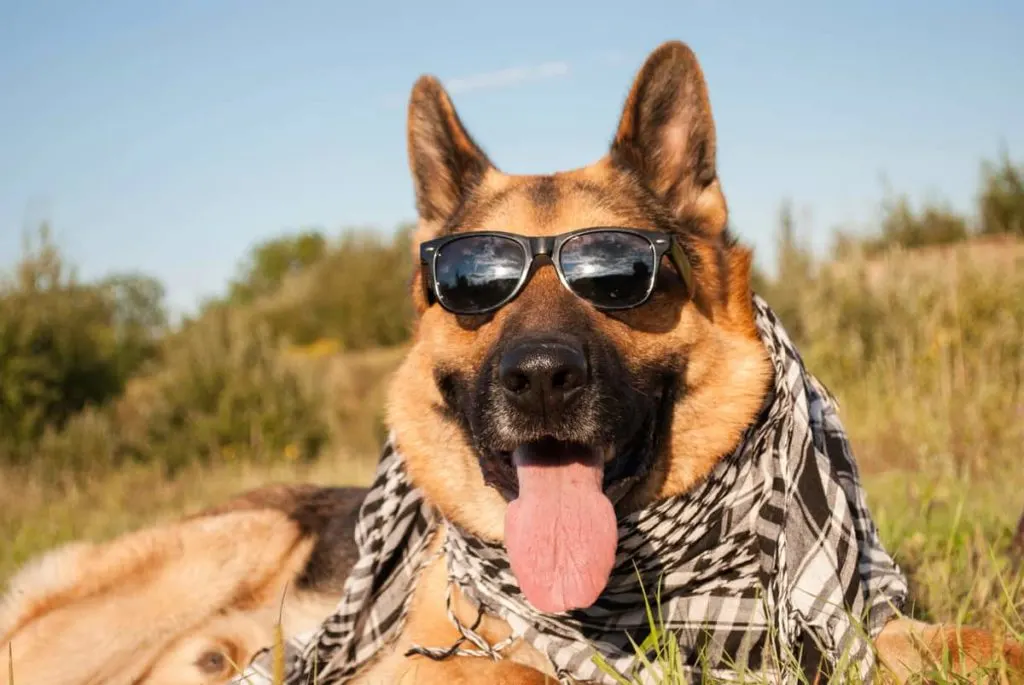
Socializing your German Shepherd is the most important part of its development. Proper socialization can make the difference between a well-behaved dog, and a dangerous member of the dog world.
Introducing your canine friend to as many outside factors as possible can set the tone of your future together, and ensure a healthy relationship between your dog and the outside world. So how do you know if you are taking the steps needed to achieve a well-socialized dog?
In this article we’ll discuss why socializing your German Shepherd is so important, and the steps you should take in your training process.
Click Here to Jump to a Section
Why is socialization so important for a German Shepherd?
When you socialize your German Shepherd, you are helping to introduce them to the world outside of your home. When we bring a dog into our lives, we have full control over how big their world will be. A GSD that only knows your home and a few select people will often be anxious, scared, and unpredictable once they step foot outside of their comfortable bubble.
By practicing socialization skills, you are truly making their lives easier. When they have the tools needed to meet other people, greet other dogs, and be confident in new environments; they will thrive.
Socialization Equals Confidence
Why does a dog need confidence? When you think of the word confidence, you think of the way you feel about yourself. When we feel confident in the skin that we’re in, we feel at our best. This is no different for a dog.
A German Shepherd’s confidence has everything to do with how they act. By introducing your GSD to new situations, you are providing them with the building blocks to create their certainty in themselves.
Imagine if you were sent out on stage to perform a dance routine for hundreds of people, and you had never even practiced. You would undoubtedly feel terrified, and probably inadequate compared to the other dancers on the stage that had actually practiced the routine. This is the exact situation that you are putting your dog in when they are not socialized.
If a dog has only known the walls inside of your home, anything other than their normal routine will have them on edge. Going out in public will be scary, they will feel beneath other dogs that they meet, and it will be difficult to handle in new situations.
By letting them experience new surroundings, you are giving them the confidence they need by giving them experience to learn from. With each new person they meet, they will be less fearful of the next. By every new park they explore, they will be more excited to see the next one. With every dog they meet, they will be less inclined to react in fear. Confidence for a dog is key.
Socialization and Age
Socialization and age go hand in hand when you are training your German Shepherd. Though it’s definitely not impossible to socialize an older dog, it is recommended to start the process as early as possible.
It has been proven that puppies and young dogs that are exposed to the world outside of their home, grow up to be significantly more well mannered compared to dogs that were not socialized properly.
If you are wondering when you should start the process of introducing your dog to new things, the answer is now.
Peak Period For Socialization In German Shepherds
A dog’s socialization period starts from the day a dog is born. They are constantly learning from their mothers, and from the interactions they have with their littermates. In an ideal environment, they will also be introduced to new smells, tastes, sounds, and people on a regular basis.
Once a puppy reaches 8 weeks of age, they enter a period in which they are like a sponge for learning. The period between 8 weeks and 20 weeks of age is a significant period in a puppy’s life, in which they learn the habits that help to mold them into who they will be as adult dogs.
Since this time period is so crucial, it is ideal to properly socialize your German Shepherd puppy in this age window.
What are the signs of an unsocialized dog?
It can be difficult to know if your German Shepherd is getting everything they need in terms of socialization. Some signs of an improperly socialized dog include:
- Fearful or aggressive around other people or dogs
- Frightened by unfamiliar sounds
- On edge or nervous when out on walks
- Fearful or aggressive when others enter your home
- Territorial of you while out on walks
- Incredibly submissive to other dogs
- Overwhelming energy towards other dogs or people
If your GSD is displaying any of the behaviors above, it may be time to consider additional socialization for your dog.
Is an unsocialized German Shepherd a big deal?
Any time that you have a large and unsocialized dog, the situation can be concerning. An unsocialized dog is often fearful of their surroundings, leading to unpredictable behavior.
A fearful dog can be dangerous on walks, around other dogs, in public settings, and at the veterinarian. You never want to put others in danger by neglecting to adequately socialize your dog.
By socializing your German Shepherd, you are creating a safer life for them and everyone that surrounds them. A life free of fear is a happy life for any dog.
Socializing German Shepherd Puppies
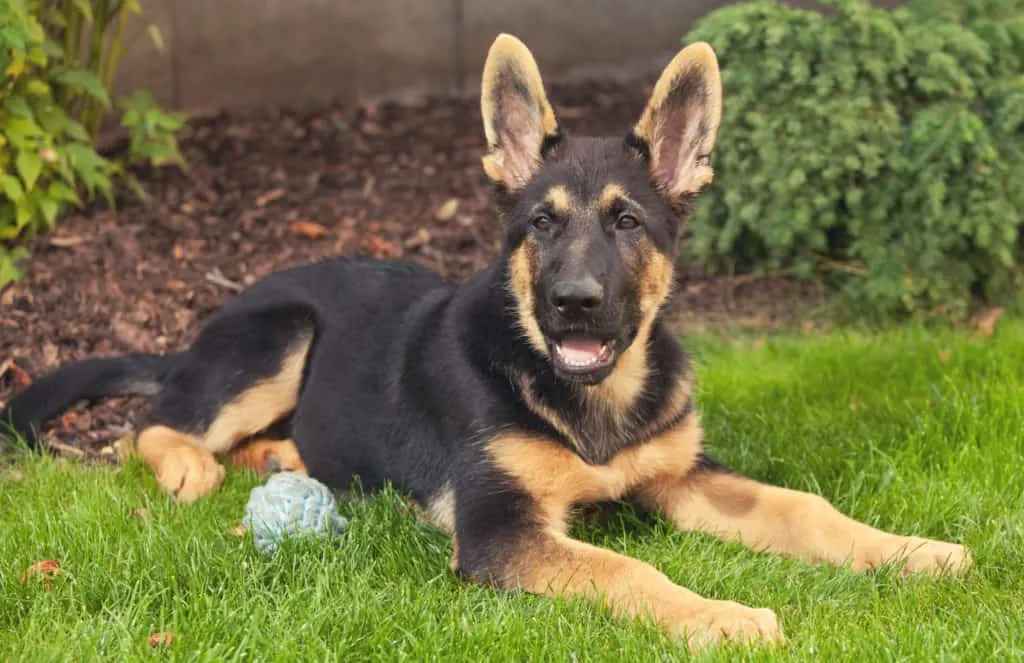
When bringing a new puppy into your home, it’s up to you to give them the opportunity to be the well-rounded pup that they can be.
During the time period of 7 weeks of age to 4 months old, their socialization period will permanently shape them into the future dogs that they will be. There are many ways in which you can socialize your German Shepherd at a young age. Some of these ways are:
- Introduce them to sounds: Sounds can be a scary thing to an unsocialized dog. You don’t want your adult dog to be terrified of every new noise they hear.
You’ll want your pup to be used to hearing common noises like:- a knock at the door
- a slammed door
- cars, motorcycles
- hairdryers
- lawnmowers
- the vacuum cleaner
- clippers
- and any other noises you think your pup may hear on a regular basis.
- Introduce them to new sights: New sights can be daunting to a nervous dog.
Some things you will want to make sure that your pup sees often are:- a variety of people
- people of each gender
- people of each race
- people of all sizes
- other dogs
- other animals
- children
- any other sights you think they may experience in your life.
- Take them to new places: The more places that your puppy has experienced, the less nervous they will be to leave the house as they get older.
Some new places you could take your dog once they are fully vaccinated are:- in your car
- to a park
- to the dog park
- to the vet
- to a friend’s house
- to dog-friendly events
- any other places you would like to visit in the future with your German Shepherd
- Show them new objects: Unfamiliar objects can frighten any pup. Showing them as many new objects as possible can help eliminate their fear of new things, and spark curiosity instead. Some objects that your dog should be used to seeing are:
- moving cars
- moving bikes
- other dogs
- other animals
- vacuums
- brooms
- mirrors
- toys
- plastic bags
- or any other objects they may experience in your home or in public.
These are just a few examples of ways you could socialize your German Shepherd puppy. If there are other events and areas you know you would like to take your dog as an adult, then make sure to start introducing them to these places when they are young.
Here is a comprehensive check-list of different places, people, and objects to introduce your puppy to.
Should my German Shepherd puppy be fully vaccinated before socializing in public?
The answer to this question is an unequivocal yes. When searching this topic online you will find several different answers.
Do your puppy and yourself a favor and ignore any advice to the contrary – your puppy SHOULD NOT socialize in a public setting until they are fully vaccinated.
Puppies will require three sets of puppy vaccines, spaced 3 weeks apart from each injection. Vaccines work by boosting immunity to infectious diseases in a dog’s body.
When you take your puppy out in public before they have received adequate protection from all three vaccines, their body is still at risk for contracting infectious illnesses.
Many puppies that contract the deadly parvovirus, are in fact puppies that were taken in public after receiving just one or two vaccines before their vaccination routine was complete. Infectious disease can be anywhere, and it is never worth the risk.
While you wait for your puppy to be fully vaccinated, you can still engage them in positive socialization experiences. For example, you can:
- Invite other people to your home.
- Take them on car rides.
- Hold them in your arms at pet stores or events, and let other people greet them.
- Take them to the vet for their routine care.
If you begin the vaccination process at 7-8 weeks of age, your pup can be fully vaccinated by 16 weeks. This leaves you plenty of time to adequately socialize your German Shepherd puppy.
Socializing Adult German Shepherds
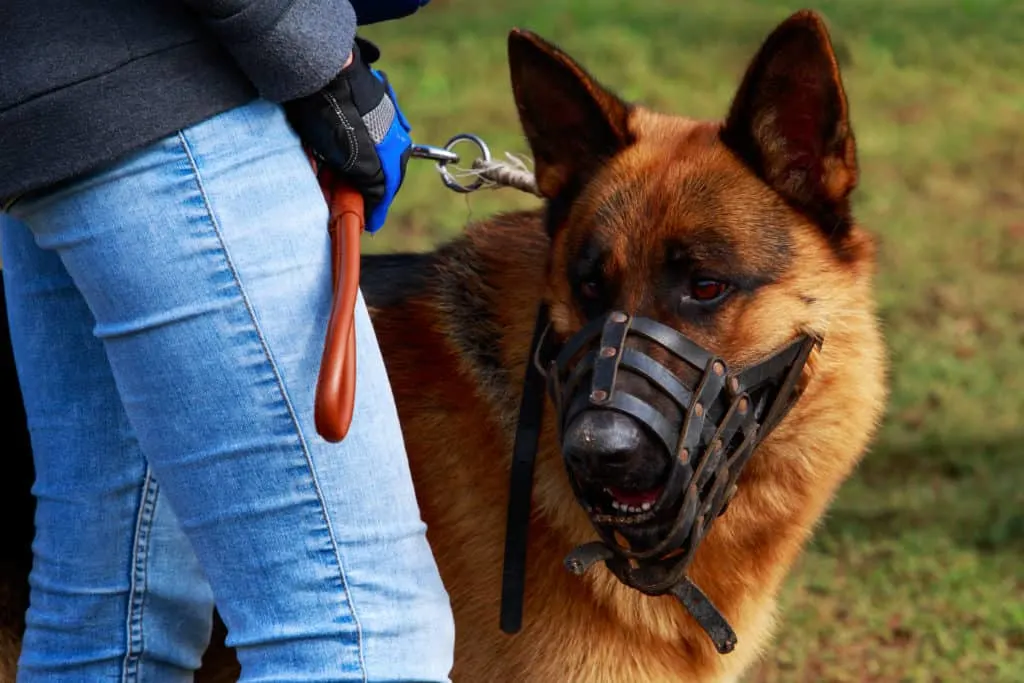
Though it’s not impossible, you may experience more of a challenge when socializing an older dog. It’s important to be patient in this process, and realize that you may be trying to break old habits while moving through the socialization process. Some ways that you can begin to socialize an older dog are:
- Take them for walks: Taking your dog for frequent walks can teach them so many things. On your walks they may see new surroundings, new people, new animals, and experience new smells. Each walk they go on will give them more experience to relate to, and will in turn boost their confidence.
- Invite people over: A dog that is not welcoming of others in your home can be dangerous. German Shepherd are known to be incredibly protective, so it’s important that you show them that not every person who enters your home is a threat.
By showing them friendly interactions with you and others in your home, they will slowly ease into the idea of new people in their environment. This will also help to show them the difference between a welcome visitor and a hostile intruder. - Introduce them to other dogs carefully: If you are adopting an older dog, you may not know about their previous experience with other dogs. Meeting other dogs is an important step, but it’s best to take this slow.
First, start by introducing them to other pups while they are both controlled on a leash. If this goes well, you can start with short supervised interactions. After these steps are successful, you can slowly work up to dog-friendly environment and parks.
Introducing Your German Shepherd To Other Dogs
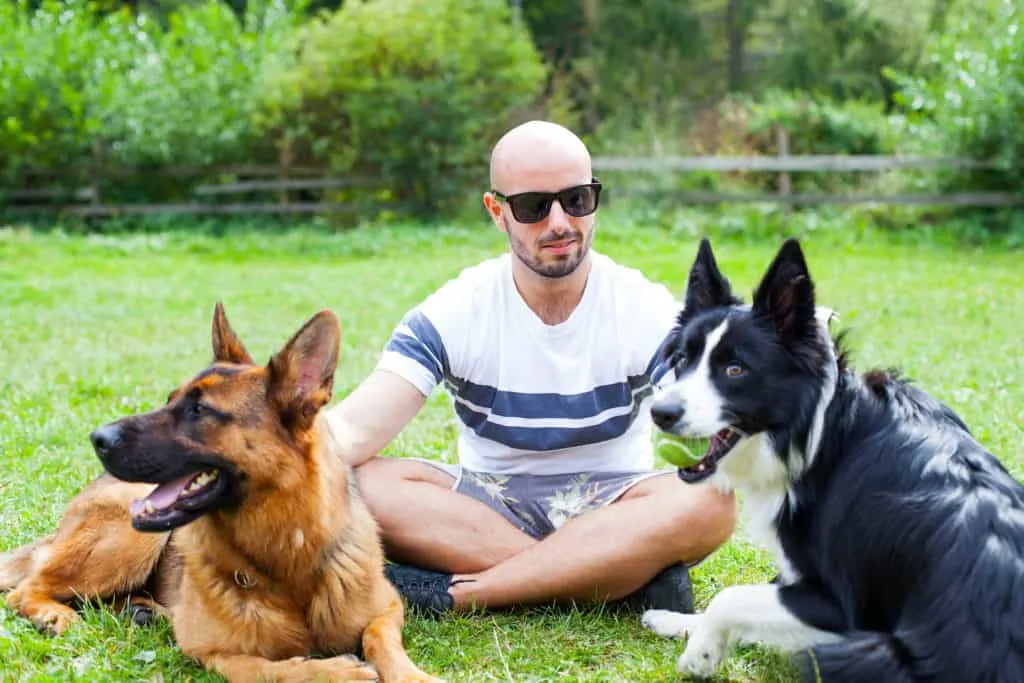
This is a major step in the socialization process that requires extra attention. Introducing your Shepherd to other dogs when they are a young puppy will be significantly easier than when they are adults.
When possible, start introducing them to other dogs and puppies once they are fully vaccinated. By doing this at a young age, you are setting them up to be a well-socialized dog who enjoys the company of other dogs.
What if they were not socialized as puppies? What if you adopted an older Shepherd with a tough past? What if they just don’t do well with other dogs? If you answered yes to any of these questions, you’ll want to consider these steps below.
- Friendly encounters: When possible, try your best to introduce your nervous dog to friendly dogs. This will make the process much easier for your dog, as they won’t have to experience the aggression from another dog. While they will most likely experience dogs of all temperaments in the future, it’s best to take it easy at first.
- Neutral areas: If your German Shepherd has never met another dog, you will not want to initiate this introduction in your own home. Shepherds can be protective of their home and may become aggressive if they fear their home is being threatened by another dog. Meeting in a neutral setting that neither dog has a tie to is best.
- Muzzles: If you fear that your dog may become aggressive with another dog, consider putting a basket muzzle on your dog. This will protect other dogs and people from being bitten, without causing your dog any discomfort.
- Leashes: Any time your dog meets another dog for the first time, keep both canines on a leash. This way you can control the situation if anything goes wrong.
- Know their limit: If your dog seems anxious, overwhelmed, panicked, aggressive, or shows any other signs of concern – take a step back. You don’t want to force an interaction on your dog when they are not ready. Try again another day.
- Don’t force it: Dogs are like people in the sense that some dogs just don’t get along. If it seems like your dog just doesn’t do well with one dog in particular, it’s best not to force the relationship.
Once you have followed these steps above, you should continue to repeat this process until your German Shepherd has become comfortable with other dogs. Each GSD is different and will require a different process than others. It’s important to be patient and to not skip steps.
Introducing Your German Shepherd To New People
German Shepherds are known for their fierce loyalty to their humans. While this is an incredible quality in a family dog, it can be quite dangerous when this trait is not controlled.
Making sure that your dog is well behaved around new people is one of the most important steps in the socialization process. Some ways to appropriately introduce your Shepherd to new people include:
- Invite family and friends over.
- Get them use to people ringing your doorbell.
- Take them to other houses.
- Take them to public settings.
- Stop and talk to people on your walks with your dog.
- Ask others to interact with your dog on walks (have the person talk to your dog, pet it, give it treats).
If there are any specific settings or people you would like them to interact with, make sure to introduce them to your dog as early as possible.
Create Positive Experiences For Your German Shepherd
Though it’s impossible to control every single experience your German Shepherd encounters, it’s ideal to try your best to make their experiences positive.
If your dog goes to a dog park before they are properly socialized and fights with another dog, they are going to associate that experience with other dogs in general. Controlling these situations when possible will help to socialize your dog in a positive way. Some ways to keep things positive for your Shepherd are:
- Take things slow: It’s important to take each step of socialization slowly. Start with the basics, and work your way to more challenging situations.
A correct pattern of socialization might be to first take your dog on walks, then invite others over, then introduce them to another dog in a controlled environment, then finally work up to social settings with other dogs. Make sure to not skip important steps. - Watch your attitude: Socializing your German Shepherd can be a frustrating process. Each dog will progress at their own rate and will need to be surrounded by an encouraging environment. Try your best to be calm, supportive, and kind in new situations for your dog.
- Offer them praise: If your dog is doing things correctly, you want to make sure to offer them the praise that they deserve.
Did it do well on your walk today? Offer it a healthy treat when you return home.
Did it play nicely with the new dog they met on your walk today? Make sure to give it extra pats and tell them what a great job they did.
These things matter to your pup and will encourage them to continue this behavior. - Work at their pace: Quickly forcing your German Shepherd out of their comfort zone is not the answer in proper socialization. If you know that they are incredibly anxious in a certain situation, it’s best to practice that scenario slowly.
For example, if you know your dog does not do well with other dogs, your first instinct should not be to set them loose in a crowded dog park. Introduce these stressful triggers in small doses. Your dog will appreciate it, and it will prevent any setbacks in your socialization process. - Negative reinforcement doesn’t work here: Proper socialization requires positive interaction. Try your best to not scold, hit, or punish your dog in any way when they are not socializing in a way you would like. Take a step back, and figure out another way that you can make this work.
Basic Obedience Training
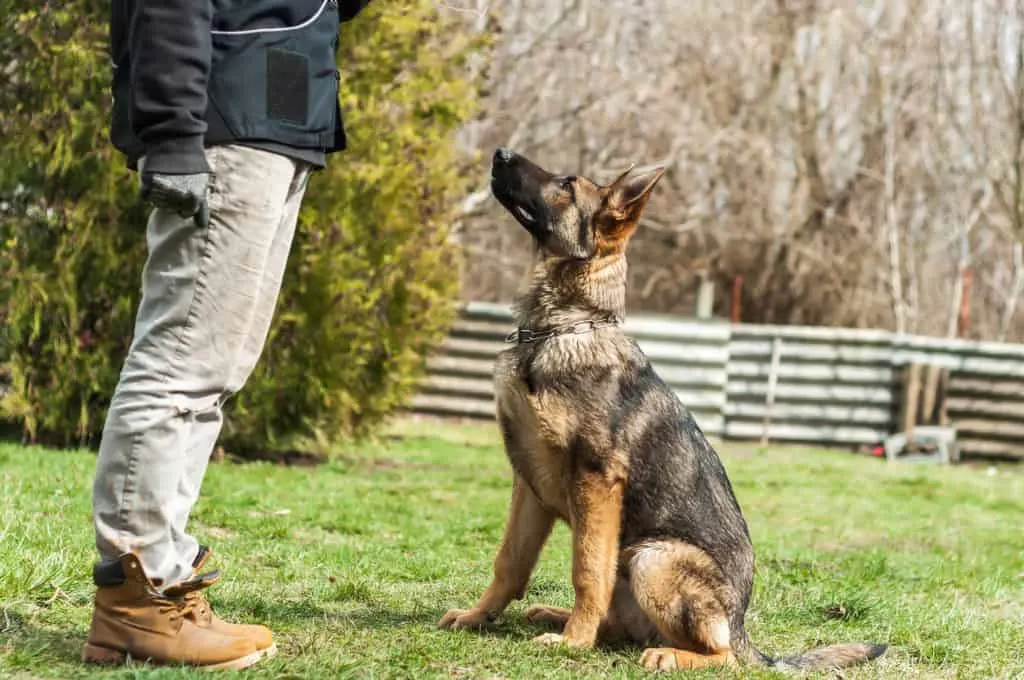
While it may seem unrelated, basic obedience training can contribute to your dog’s overall confidence. German Shepherds are incredibly obedient dogs that love to please their owners. By teaching them basic commands, you are giving them purpose, and fulfilling their needs to serve their people.
It’s been shown that a mentally stimulated dog is a happy dog. By giving them new challenges and commands to learn, you are helping to keep them mentally fit. Some basic obedience training includes:
- Sit
- Stay
- Lay down
- Come
- Leave it
- Be quiet
- Down
Professional Socialization For Your German Shepherd
Luckily, you’re never on your own in the socialization process of your German Shepherd. Every dog is different, and some may require more help than others. If socializing your dog is particularly tricky, or you would just like some professional assistance in this process, there is an option for you.
Puppy socialization classes: There are always several options for socialization and obedience training for puppies. In these classes they will have puppies interact in a controlled setting, while also teaching them basic obedience and commands. This is a great introduction to a world outside of their home and can help to mold them into well-behaved adults.
Obedience training for adult dogs: Just as there are options for puppies, there are also socialization classes for older dogs. These classes work around the same framework of practicing healthy interactions while teaching your dog basic commands to boost their confidence.
Specialized training: If you have a Shepherd that is particularly difficult in any aspect of socialization, you can turn to professionals. There are classes everywhere for nervous, shy, aggressive, or downright difficult dogs. Some training difficulties are out of the average dog owner’s skills, and there is nothing wrong with turning to a professional in those situations.
Doggie daycare: Doggie daycare is an incredible opportunity for additional interaction for dogs who are already comfortable with other dogs. This gives them the opportunity to interact with dogs of all sizes, ages, and temperaments.
Know The Signs Of A Stressed Out Dog
While you are socializing your German Shepherd, there will be times that they are pushed out of their comfort zone. While some nerves are to be expected, it’s important to know when your dog has had enough. Some signs to look for in a stressed out GSD are:
- Whining
- Shaking
- Pacing
- Tail tucked between their legs
- Hackles up
- Growling
- Aggression
If your dog is experiencing signs of stress in a new situation, it’s best to either take things slow, or try again another day. As previously discussed, it’s important to try and make each new situation as positive as possible for your dog. If your dog is completely overwhelmed, then there will be no progress made.
Exercise and Socialization Are Related
German Shepherds are an extremely energetic breed. They thrive in an active environment and can begin to misbehave when they are not getting the exercise that they need. Lack of proper exercise can lead to pent up energy, which can be displayed as a number of different behavioral problems.
A mentally and physically stimulated German Shepherd has everything they need to live a healthy and fulfilled life in every aspect. Some ways to get your German Shepherd active are to:
- Go on frequent walks
- Take your GSD on hikes
- Play fetch
- Play frisbee
- Go for a swim
- Dog parks once socialized
- Dog play dates
- Stimulating dog toys
- Interactive games
- Doggie daycare
- Dog sports
The recommended daily exercise for a German Shepherd is 45 minutes a day. By meeting your dog’s daily needs, you can help to limit any behavioral issues.
Final thoughts
Socialization is widely considered the most important step in a dog’s training process. Proper socialization can improve your dog’s quality of life by not only opening them up to new opportunities, but also by limiting their daily stress.
A well-socialized dog is a happy dog, free of the anxieties that come with fear of the unknown. Socializing our dogs is one of the best things that we can do for them!
